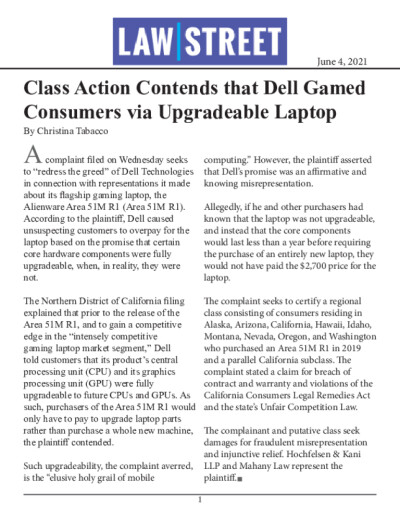A complaint filed on Wednesday seeks to “redress the greed” of Dell Technologies in connection with representations it made about its flagship gaming laptop, the Alienware Area 51M R1 (Area 51M R1). According to the plaintiff, Dell caused unsuspecting customers to overpay for the laptop based on the promise that certain core hardware components were fully upgradeable, when, in reality, they were not.
The Northern District of California filing explained that prior to the release of the Area 51M R1, and to gain a competitive edge in the “intensely competitive gaming laptop market segment,” Dell told customers that its product’s central processing unit (CPU) and its graphics processing unit (GPU) were fully upgradeable to future CPUs and GPUs. As such, purchasers of the Area 51M R1 would only have to pay to upgrade laptop parts rather than purchase a whole new machine, the plaintiff contended.
Such upgradeability, the complaint averred, is the “elusive holy grail of mobile computing.” However, the plaintiff asserted that Dell’s promise was an affirmative and knowing misrepresentation.
Allegedly, if he and other purchasers had known that the laptop was not upgradeable, and instead that the core components would last less than a year before requiring the purchase of an entirely new laptop, they would not have paid the $2,700 price for the laptop.
The complaint seeks to certify a regional class consisting of consumers residing in Alaska, Arizona, California, Hawaii, Idaho, Montana, Nevada, Oregon, and Washington who purchased an Area 51M R1 in 2019 and a parallel California subclass. The complaint stated a claim for breach of contract and warranty and violations of the California Consumers Legal Remedies Act and the state’s Unfair Competition Law.
The complainant and putative class seek damages for fraudulent misrepresentation and injunctive relief. Hochfelsen & Kani LLP and Mahany Law represent the plaintiff.
